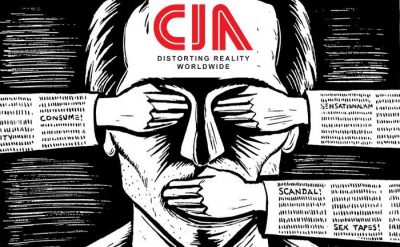Joel
Whitney is a co-founder of the magazine Guernica, a magazine of
global arts and politics, and has written for many publications,
including the New York Times and Wall Street Journal. His book Finks:
How the C.I.A. Tricked the World's Best Writers describes
how the CIA contributed funds to numerous respected magazines during
the Cold War, including the Paris Review, to subtly promote
anti-communist views. In their conversation, Whitney tells Robert
Scheer about the ties the CIA’s Congress for Cultural Freedom had
with literary magazines. He talks about the CIA's attempt during the
Cold War to have at least one agent in every major news organization
in order to get stories killed if they were too critical or get them
to run if they were favorable to the agency. And they discuss the
overstatement of the immediate risks and dangers of communist regimes
during the Cold War, which, initially, led many people to support the
Vietnam War.
James
Jesus Angleton was part of this post-OSS group
that understood how important spying and covert ops had been in World
War II. And from there, he makes all kinds of terrible mistakes. He
and his group believed essentially that they needed to do better
propaganda than the Soviets did, and one of the ways that they
thought they could do it better was to do it subtly and, you could
say, secretly.

So,
when this program is threatened with exposure in ‘64, ‘65, ‘66
and ‘67 through various sources like Ramparts and The New York
Times, this privilege of secrecy that they enjoyed was not something
that they were willing to give up. So you have something that is
described as relatively benign, this funding of culture through the
Congress for Cultural Freedom, a funding of student movements through
the National Student Association, the funding of labor unions that
would be less communist-influenced than the communist-dominated ones
that they presumed were out there. These were seen as benign answers.
They were reactions to Soviet penetration. So, secrecy is a key to
making them work.
So,
even if you want to make the argument that, for instance, the
Congress for Cultural Freedom never censored its magazines–which I
think has been severely disproved; they did censor. Even if you
wanted to say that they published all sorts of great writers–which
clearly they did; that was part of the subtlety of it and part of the
brilliance of it, and part of the soft-power charm of it. Even if you
wanted to say all that, when the secrecy is exposed by honest
accounting in the media, the fourth estate, the adversarial media of
American bragging around the world, they are so attached to their
secrecy, and so upset, the CIA group led by people like Angleton,
that they commit something that is about as anti-American as anything
in our system. Which is: more secrecy, more media penetration to the
point of penetrating, first, the anti-Vietnam War press; second, the
student, the college student newspapers and press; the alternative,
so-called, press. Which essentially is a license to do what they did
later. So, where Ramparts was penetrated, leads to Operation Chaos,
presumably; that leads to Operation Mockingbird in the seventies.
By
the time we have Carl Bernstein reporting on Operation Mockingbird,
and John Crewdson reporting on its international equivalent in the
New York Times–Bernstein in Rolling Stone–you essentially see the
CIA trying to have at least one agent at every major news and media
organization it can do in the world.
And
Crewdson reporting in the Times at the end of 1977 essentially says
that they had one agent or contract agent at a newspaper in every
world capital on Earth. They could get stories killed or get stories
to run that portrayed the CIA’s views in a favorable way, or kill
them if they did not.
Comments
Post a Comment